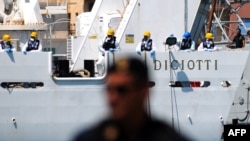Italy's hard-line interior minister refused Thursday to let 67 migrants disembark from an Italian coast guard ship until an investigation determines whether any of them had violently threatened their rescuers to prevent being returned to Libya.
The Diciotti ship pulled into the port of Trapani after taking on board the migrants from an Italian-flagged oil rig supply tug that rescued them Sunday off the coast of Libya. The dispute over what transpired next has turned into the latest standoff since Italy's anti-migrant government took power last month.
Italy's transport minister says the tug reported that some of the migrants made "death threats" against the crew.
"As soon as our ship turned south, to be able to meet up with a Libyan coast guard ship to transfer the migrants, they started to threaten the crew," Christopher Savoye, legal affairs official of the Vroon Offshore Service that owns the Vos Thalassa tug, told the shipping news site The Meditelegraph. "They encircled them, pushed them, making the gesture of cutting their throats."
The tug requested assistance, and the migrants were transferred to the Italian coast guard's Diciotti. By late Thursday, it was still docked at Trapani's port, with no authorization to let its passengers ashore.
Interior Minister Matteo Salvini said he wouldn't give the OK until prosecutors determine whether the migrants actually did make the threats, or if the crew of the Vos Thalassa "exaggerated" the danger.
"Someone is lying," he told reporters in Innsbruck, Austria. "Until I have clarity, I personally as interior minister, as vice premier and as a father, won't let them get off."
Humanitarian organizations, including UNICEF, the U.N. refugee agency, Doctors Without Borders and Save the Children, demanded that the migrants be allowed to disembark to receive care.
"The refugees and migrants, among them women, children and adolescents, have been at sea for at least four days," the aid groups said. "[We] request the urgent activation of primary health care, the authorization for everyone to disembark starting with minors and vulnerable people, and the supply of first aid to all those on board."
On the docks, activists protested Italy's hard-line position. Many protesters wore the red T-shirts that have become a symbol of those favoring a broader welcome for migrants, who often dress their children in red to make them easier to spot at sea if their smuggling boats capsize.
Salvini spoke after meeting in Austria with his European Union counterparts, including the Austrian and German interior ministers who along with Italy have agreed to press the EU to take a tougher line on migration.
Austria's Herbert Kickl said the new "axis" wants "to send a clear message to the world, and especially to the traffickers, that it won't be possible anymore in the future, shouldn't be possible anymore to step on European soil if you don't have a right to protection."
Salvini said he hoped Italy's hard-line position becomes the European position. He wants to reduce the number of migrants leaving North Africa to reduce the arrivals in Europe and deaths in the Mediterranean along the way. He says that will reduce tensions among European nations over their internal borders.
"Obviously, if you drastically reduce the departures and arrivals, the problems inside the EU among individual countries will also be reduced," he said.
He said he hoped Europe as a whole will continue to recognize the "minority" of people who deserve asylum because they are fleeing war, but not the others.
"We hope that finally the European Union resumes defending its borders and the right to security of 500 million European citizens who in recent years have been put at risk," Salvini said.






